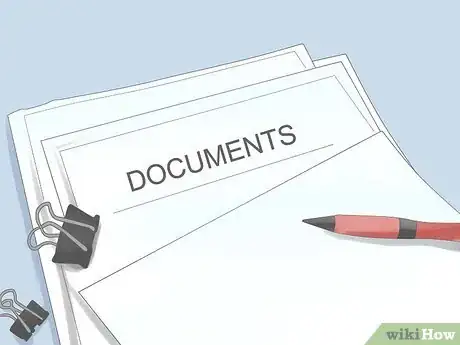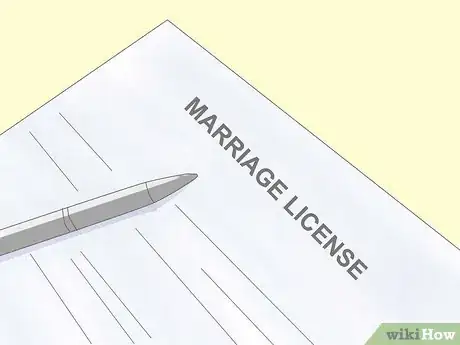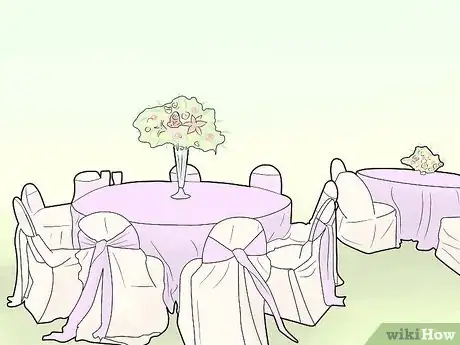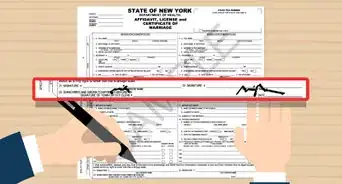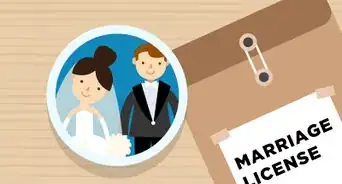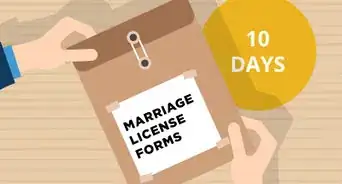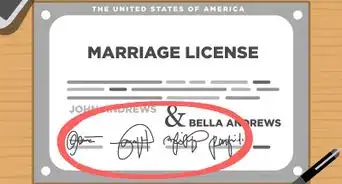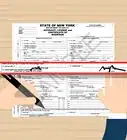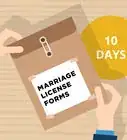This article was co-authored by Clinton M. Sandvick, JD, PhD. Clinton M. Sandvick worked as a civil litigator in California for over 7 years. He received his JD from the University of Wisconsin-Madison in 1998 and his PhD in American History from the University of Oregon in 2013.
There are 12 references cited in this article, which can be found at the bottom of the page.
This article has been viewed 29,109 times.
Whether you are from out of state or you a native, knowing how to get married in Idaho can be a daunting task if you have never planned an event like this before. On top of all the other things you've been planning, like caterers and photographers, you'll need to gather all the necessary documents and secure a marriage license in your County Recorder's office. Learning how to meet all of the state requirements can help make your special day run smoothly and be a joyful occasion without as much stress.
Steps
Obtaining a Marriage License
-
1Learn Idaho marriage laws. Before you attempt to get your marriage license, you should learn the state laws that govern marriage in the State of Idaho to ensure that you're able to proceed. There are some stipulations regarding who can and cannot get married, and under what conditions.
- You are not required to be a resident of the State of Idaho to get a marriage license, but your marriage ceremony (either civil or religious) must take place in Idaho.[1]
- As of 2015, same-sex marriages are recognized in all U.S. States.
- If you are age 16 or 17, you must be accompanied by a parent/legal guardian, or provide a notarized statement of consent signed by your parent or guardian.
- If you are under the age of 16, you will need a notarized statement of parental consent and permission from the court.
- In the State of Idaho, proxy marriages (where a person stands in as a proxy if one or both partners cannot physically attend the wedding) are not permitted.
- Common law marriages (where two partners cohabit and choose to forego a formal civil or religious ceremony) are also not permitted in Idaho.[2]
- Marriages between relatives of any degree are prohibited and considered void from the beginning, regardless of the relationship's legitimacy.
- Polygamous marriages are illegal and void. The only way a spouse may marry another person without being divorced is if the former marriage has been annulled or dissolved, or if the other spouse has been missing and presumed dead for five successive years.
- There is no blood test required in the State of Idaho. However, at the recorder's office, you will need to read and sign a premarital AIDS educational pamphlet in front of a county representative.[3]
-
2Gather your documents. If you meet the conditions for marriage, you will need to bring supporting documents to the county office before your marriage license will be granted. Each applicant will need to arrive in person and provide the following documents:
- a social security card (if you are a non-U.S. resident, you should instead bring a valid ID from the country where you hold citizenship)
- a current driver's license, state-issued ID card, passport, or birth certificate (the county will accept either your original birth certificate or certified copy)
Advertisement -
3Bring cash for the filing fee. Before receiving your marriage license, you will have to pay a filing fee to the county. That fee may vary, depending on which county you receive your marriage license in, but will generally cost around $30.
- Some County Recorder's offices will accept credit/debit card payments.[4] However, most do not accept checks or cards, and will only take cash.
- In some counties, you may have to pay an additional fee (approximately $20) to get married on a Saturday.
- Contact your County Recorder's office to find out exactly how much your marriage license will cost and what form(s) of payment that office accepts.
-
4Visit your County Recorder's office. All marriage licenses in the State of Idaho are issued by the County Recorder's office. To find your local recorder's office, you can search online or check your local phone book.
- You typically do not need an appointment to receive your marriage license. However, you may want to call your local recorder's office just to be sure.
- If you've been divorced or widowed, you will need to provide the date of your divorce or the date of your spouse's death.[5]
-
5Obtain your marriage license. There is no waiting period to receive your marriage license. You will receive your license at the time you file for one, provided you have all of the necessary documents, sufficient funds, and meet the state requirements for marriage.
- You will receive two copies of your marriage license. One copy has a gold seal, and is yours to keep; the other copy must be filed with the county within 30 days of the ceremony.
- Your Idaho marriage license does not expire. However, if it is not used within one year, you will need to contact the Idaho Department of Vital Records and Health Statistics to learn how to proceed.[6]
- Remember that you are not legally married after obtaining a marriage license. You will still need to have an authorized clergy member, judge, or otherwise designated official perform a civil or religious ceremony.
Getting Married in a Civil Ceremony
-
1Choose where to get married. Once you've secured your marriage license, you have many options available in choosing where to get married. There is no waiting period, so once you've obtained your license you're free to get married the same day (if you have a location and officiant lined up).
- Your marriage license is only valid in Idaho, but you do not have to get married in your county of residence.
- You can find wedding venues by searching online. However, you'll probably need to plan your venue out in advance and reserve your date to ensure that it's available.
- If you prefer to get married at the courthouse, a judge can and will marry you there. You will need to make an appointment in advance, and you'll need to pay additional fees.[7]
- Contact your courthouse's judicial secretary to make an appointment for a judge to perform the ceremony.
-
2Designate an officiant. In a civil ceremony, you can be married by anyone who is authorized to perform weddings. If you prefer, you can have a friend or relative to perform the ceremony. There is no state law that requires a wedding officiant to be a registered minister; however, some county registrars have asked for proof of ordination in the past.[8]
- Authorized judicial officials include a current or retired supreme court justice, appeals judge, district judge, federal judge, district court magistrate, as well as a current/former governor or the current lieutenant governor.
- Other qualifying officiants include a current tribal judge or tribal official of an Idaho Indian tribe, or a priest/minister of any denomination.
-
3Hold a civil ceremony. Once you've secured a marriage license and chosen an officiant, you can have a civil ceremony anywhere you'd like. The only requirement is that the ceremony must be held within the State of Idaho if your marriage license was issued in that state. You do not need a witness for the marriage, and your ceremony can be as large or as small as your location can accommodate.[9]
- A civil ceremony will typically involve the exchange of vows and rings, just like a religious ceremony would.[10]
- Many people choose to have a judge perform the ceremony in a courthouse.[11]
- If you decide to have your ceremony at a destination outside a courthouse, you can choose someplace that has personal significance (like a park where you had your first date), or you may choose a location out of convenience.
- Search online for ideas and inspiration. There are many resorts and retreat locations in Idaho that host weddings, so find a place that fits you budget and your aesthetic.
Having a Religious Ceremony
-
1Find an officiant. Your choice of officiant may depend on your religious affiliations, your location, or both. You can be married by an authorized clergy member, judge, or otherwise designated official.
- For religious ceremonies, you can legally be married by a priest/minister of any denomination.
- If you have someone you'd like to become ordained to serve as an officiant, he or she can easily do this online.
- You can get ordained through an interfaith ordination service like the Universal Life Church or the American Marriage Ministries.[12] Ordination is free and does not expire, though it may be restricted to the state in which you register.
-
2Talk to your religious leader. Depending on your religion, you may need to have an in-person "interview" with the pastor/priest/deacon who will perform your marriage. This is done in order to get to know the marrying couple, and to determine if there are any unresolved issues that would complicate a religious marriage (such as a previous marriage).[13]
-
3Choose a location. If you've chosen a priest/minister/rabbi, you may choose to hold the ceremony in that officiant's primary place of worship. However, many people have affiliations with their own place of worship, and may wish to have the ceremony at their own church/temple.
- Contact the church/temple in advance to secure a date for your wedding. You'll typically need to give at least six months' notice (though you may wish to give a full year's notice) if you want to reserve a date.[14]
- Some religions require the wedding to be held at the specific place of worship one of the partners is affiliated with. However, permission can typically be granted to have the wedding in a different place of worship if the marrying couple makes a request to their religious leader.
- Look for information online to find out who in your church/temple makes reservations and arrangements for a wedding ceremony.
- Be honest with your pastor/priest/deacon. If you lie about anything and he or she finds out, that religious leader may refuse to perform the wedding.
- You'll need to pay your parish/church/temple for the preparations they make, as well as for hosting the wedding itself. These fees may be a voluntary donation, or a specified amount (typically between $300 and $500).
- Make sure you have an official copy of your baptismal certificate if you wish to get married in a church. You may also need to prove to the pastor/priest/deacon that you are an active member of that parish.
-
4Hold the religious ceremony. Depending on your religious affiliation, the marriage ceremony may include portions of a regular religious service. In a Christian wedding, for example, the priest/deacon/pastor will give a blessing, and there will be prayers and readings from the Bible before the vows and rings are exchanged. [15]
Following Up After the Ceremony
-
1Consider holding a wedding reception. Some people opt for a small, private ceremony with few or no guests invited. Others plan a huge, extravagant wedding and invite over 100 guests. There is no right or wrong choice here, as it is mostly a matter of preference. If you do host a wedding reception, you may want to consider:
- hiring a caterer or catering the wedding yourself
- renting a reception hall
- inviting family and friends of both partners
- hiring a DJ to provide music
-
2Have the officiant submit your paperwork. When you received your marriage license, you should have gotten two copies: a top copy with a gold seal, which is yours to keep, and a bottom copy, which is kept on file as proof of the marriage. The officiant of your ceremony will have to fill out the bottom portion of both copies of your marriage license (under the heading "Marriage Certificate") and submit the county's copy (the one without a gold seal) by mail or in person to the county Recorder's Office within 30 days of the ceremony. Specifically, the officiant will need to fill out:
- his/her name and capacity (priest, minister, judge, etc.)
- the officiant's phone number and mailing address, including the city, county, state, and zip code in which the officiant resides
- the full date of the ceremony (day, month, and year)
- the city and county in which the ceremony was performed (remember that it must be performed somewhere in the State of Idaho)
- the printed names and signatures of any witnesses present, though witnesses are not required in Idaho
- the officiant will need to sign the marriage certificate in order for it to be official
-
3Learn how to change your last name. There is no requirement that either party must change their last name after being married. However, often times one partner will take the other partner's name, or both partners may choose to hyphenate their names together. These changes are not done automatically after the ceremony, and if you decide to change your name(s) you will need to do so yourself.
- If you want to change your name(s), you will need to bring a certified copy of your marriage license to both the Social Security Office and the Department of Motor Vehicles (DMV). You will receive the certified copy of your license by mail at your current address after the officiant has filed the license with the Recorder's Office.
- You can find your local Social Security Office by entering your zip code on the Social Security Administration's website at https://secure.ssa.gov/ICON/main.jsp.
- You can find your local DMV office by browsing through the Idaho DMV directory at http://itd.idaho.gov/itddmv/.
-
4Join your households. Once you're married, you'll most likely move in together into your partner's home, your home, or a brand new home. This is an exciting time, but there are a lot of things you'll need to consider.
- You'll need to change your address if you move in with your partner (or vice versa). You can change both your driver's license and vehicle registration with one simple form through the Idaho Transportation Department, available online at http://itd.idaho.gov/wp-content/uploads/2016/06/Address.pdf.
- After completing the change of address form, you can submit the form by mail, by fax, through email, or in person at your local DMV.[16]
- Once you're married, you'll be eligible to either add your partner to your insurance policy or be added to your partner's policy. If your partner has children, you'll need to contact your insurance agency to add them as new dependents.
- You may choose to merge your bank accounts, or you may decide to keep them separate. Joint accounts are convenient, but depending on your respective incomes and expenditures, you may decide to maintain separate accounts.[17]
- If you choose to have a joint bank account, make sure both partners contribute equally. You can still maintain separate accounts in addition to the joint account, but make sure your partner knows about your other account so it doesn't seem like a secret.[18]
- Decide on a way to split up utilities, bills, rent/mortgage, and other expenses. There's no right or wrong way to do this, so long as both partners feel that the arrangement is fair and the expenses are covered.
Warnings
- Having a marriage license does not mean that you are married. In the State of Idaho, you must perform a ceremony (either civil or religious), and the officiant must complete the blank portion of your marriage license and submit it to the county Recorder's Office.⧼thumbs_response⧽
References
- ↑ http://www.kcgov.us/departments/recorder/marriage/marriage.asp
- ↑ http://www.weddingvendors.com/marriage-license-laws/united-states/idaho/
- ↑ http://www.twinfallscounty.org/clerk/marriage/
- ↑ http://www.twinfallscounty.org/clerk/marriage/
- ↑ http://www.weddingvendors.com/marriage-license-laws/united-states/idaho/
- ↑ http://www.healthandwelfare.idaho.gov/Health/VitalRecordsandHealthStatistics/tabid/1504/Default.aspx
- ↑ http://www.twinfallscounty.org/clerk/marriage/
- ↑ https://theamm.org/minister-licensing/idaho/
- ↑ http://www.kcgov.us/departments/recorder/marriage/marriage.asp
- ↑ https://www.mml.org/pdf/Marriage%20Ceremony%20Handbook%20-%20final%20with%20cover.pdf
- ↑ http://www.twinfallscounty.org/clerk/marriage/
- ↑ http://www.themonastery.org/wedding-laws/idaho#step-1
- ↑ http://catholicweddinghelp.com/wedding-planning/02-contacting.htm
- ↑ http://catholicweddinghelp.com/wedding-planning/02-contacting.htm
- ↑ http://www.godweb.org/marriage3.htm
- ↑ http://www.dmv.org/id-idaho/change-address.php
- ↑ http://banking-law.lawyers.com/consumer-banking/joint-versus-separate-accounts-for-married-couples.html
- ↑ http://www.forbes.com/sites/learnvest/2012/09/10/how-to-combine-finances-with-your-partner/#1ebba4674ee7

